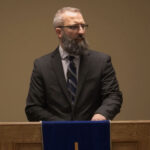* In the video, go to 5:17 for the start of the recording.
In early October members of Fairview Baptist Church and other area churches handed out pamphlets at a Muslim outreach event (see notes for pamphlet). A few days before this debate the Ahmadiyya Muslim community in Calgary contacted me to arrange a discussion.
As always, in a debate, there is not enough time to address every single point raised by either speaker. There are a few points that I wish to add to the discussion after the fact.
1. Imam Cheema quoted Hebrews 5:7 as support that Jesus did not die. What I failed to make clear is that the text of Hebrews constantly affirms the physical death of Jesus. Texts must be read in context. In a similar vein, he quoted Isaiah 53:12 and John 17:3 to try and support his points but verses before and after refute his claims.
2. Imam Cheema, as an Ahmadi Muslim, holds to the Swoon Theory. That is, Jesus was crucified but did not die. (Most Muslims argue that Jesus was not even put on the cross.) The Swoon Theory was proposed by liberal Christian scholars in the 1800s and was refuted a short time after that. Basically, not only was Jesus' survival on the cross near impossible, Christianity would not have even come about!
3. One question centered around the preservation of the Bible. I forgot to mention the words of Jesus: "For truly, I say to you, until heaven and earth pass away, not an iota, not a dot, will pass from the Law until all is accomplished" (Matt 5:18); "Heaven and earth will pass away, but my words will not pass away" (Mark 13:31).
4. Little discussion centered around the Trinity. The Qur'an clearly suggests that Christians worship God, Mary, and their son Jesus as three gods. Imam Cheema pointed to the Roman Catholic practice of venerating Mary to the point of worship (Mariolatry). What must be noted was that this practice grew in the last few hundred years and not before Muhammad. In fact, no Christian doctrine was so clearly defined and defended in the early centuries as the Trinity.

